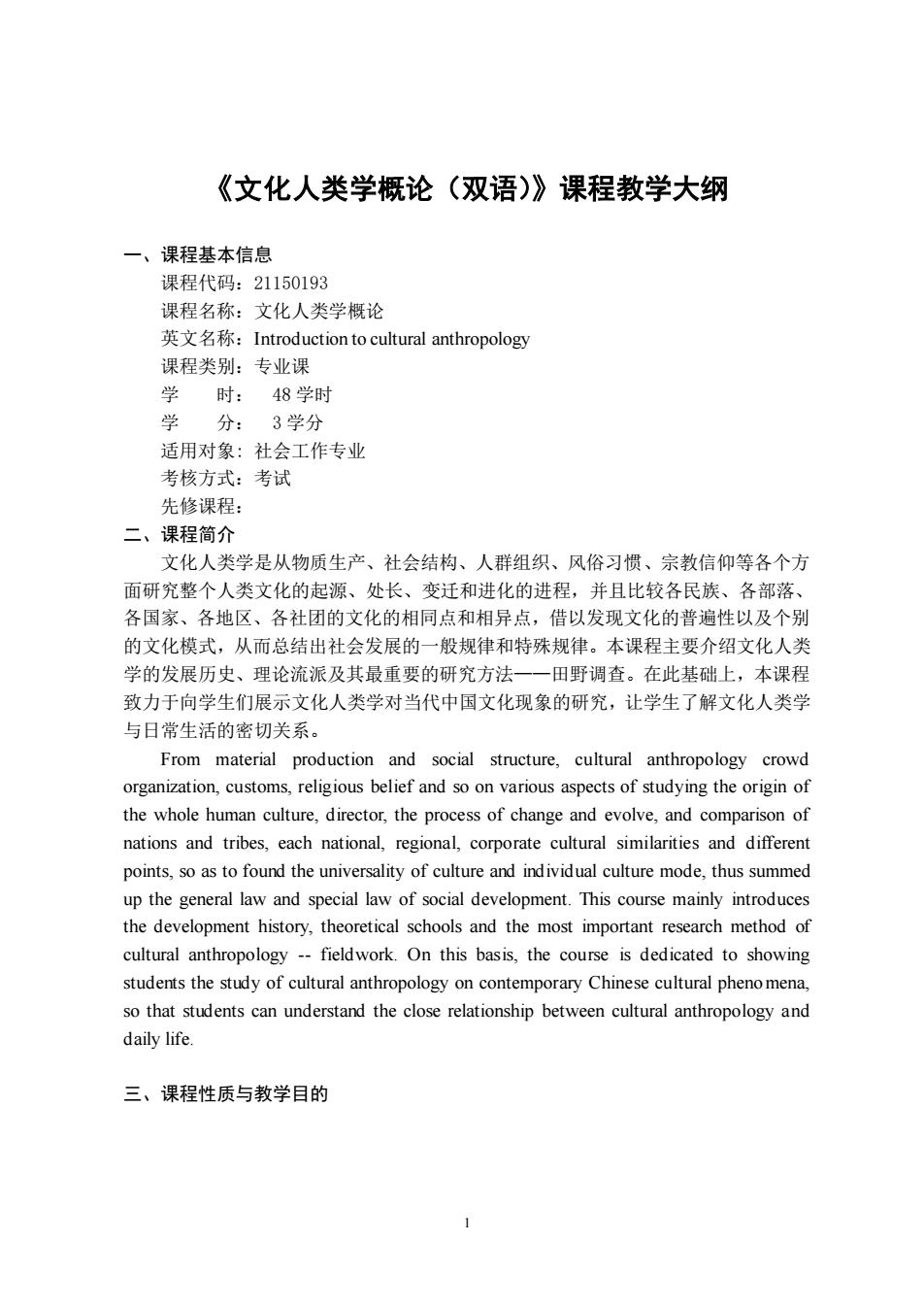
《文化人类学概论(双语)》课程教学大纲 一、课程基本信息 课程代码:21150193 课程名称:文化人类学概论 英文名称:Introduction to cultural anthropology 课程类别:专业课 时: 48学时 学 分: 3学分 适用对象:社会工作专业 考核方式:考试 先修课程: 二、课程简介 文化人类学是从物质生产、社会结构、人群组织、风俗习惯、宗教信仰等各个方 面研究整个人类文化的起源、处长、变迁和进化的进程,并且比较各民族、各部落、 各国家、各地区、各社团的文化的相同点和相异点,借以发现文化的普遍性以及个别 的文化模式,从而总结出社会发展的一般规律和特殊规律。本课程主要介绍文化人类 学的发展历史、理论流派及其最重要的研究方法一一田野调查。在此基础上,本课程 致力于向学生们展示文化人类学对当代中国文化现象的研究,让学生了解文化人类学 与日常生活的密切关系。 From material production and social structure,cultural anthropology crowd organization,customs,religious belief and so on various aspects of studying the origin of the whole human culture,director,the process of change and evolve,and comparison of nations and tribes,each national,regional,corporate cultural similarities and different points,so as to found the universality of culture and individual cuture mode,thus summed up the general law and special law of social development.This course mainly introduces the development history,theoretical schools and the most important research method of cultural anthropology--fieldwork.On this basis,the course is dedicated to showing students the study of cultural anthropology on contemporary Chinese cultural pheno mena so that students can understand the close relationship between cultural anthropology and daily life. 三、课程性质与教学目的
1 《文化人类学概论(双语)》课程教学大纲 一、课程基本信息 课程代码:21150193 课程名称:文化人类学概论 英文名称:Introduction to cultural anthropology 课程类别:专业课 学 时: 48 学时 学 分: 3 学分 适用对象: 社会工作专业 考核方式:考试 先修课程: 二、课程简介 文化人类学是从物质生产、社会结构、人群组织、风俗习惯、宗教信仰等各个方 面研究整个人类文化的起源、处长、变迁和进化的进程,并且比较各民族、各部落、 各国家、各地区、各社团的文化的相同点和相异点,借以发现文化的普遍性以及个别 的文化模式,从而总结出社会发展的一般规律和特殊规律。本课程主要介绍文化人类 学的发展历史、理论流派及其最重要的研究方法——田野调查。在此基础上,本课程 致力于向学生们展示文化人类学对当代中国文化现象的研究,让学生了解文化人类学 与日常生活的密切关系。 From material production and social structure, cultural anthropology crowd organization, customs, religious belief and so on various aspects of studying the origin of the whole human culture, director, the process of change and evolve, and comparison of nations and tribes, each national, regional, corporate cultural similarities and different points, so as to found the universality of culture and individual culture mode, thus summed up the general law and special law of social development. This course mainly introduces the development history, theoretical schools and the most important research method of cultural anthropology -- fieldwork. On this basis, the course is dedicated to showing students the study of cultural anthropology on contemporary Chinese cultural phenomena, so that students can understand the close relationship between cultural anthropology and daily life. 三、课程性质与教学目的
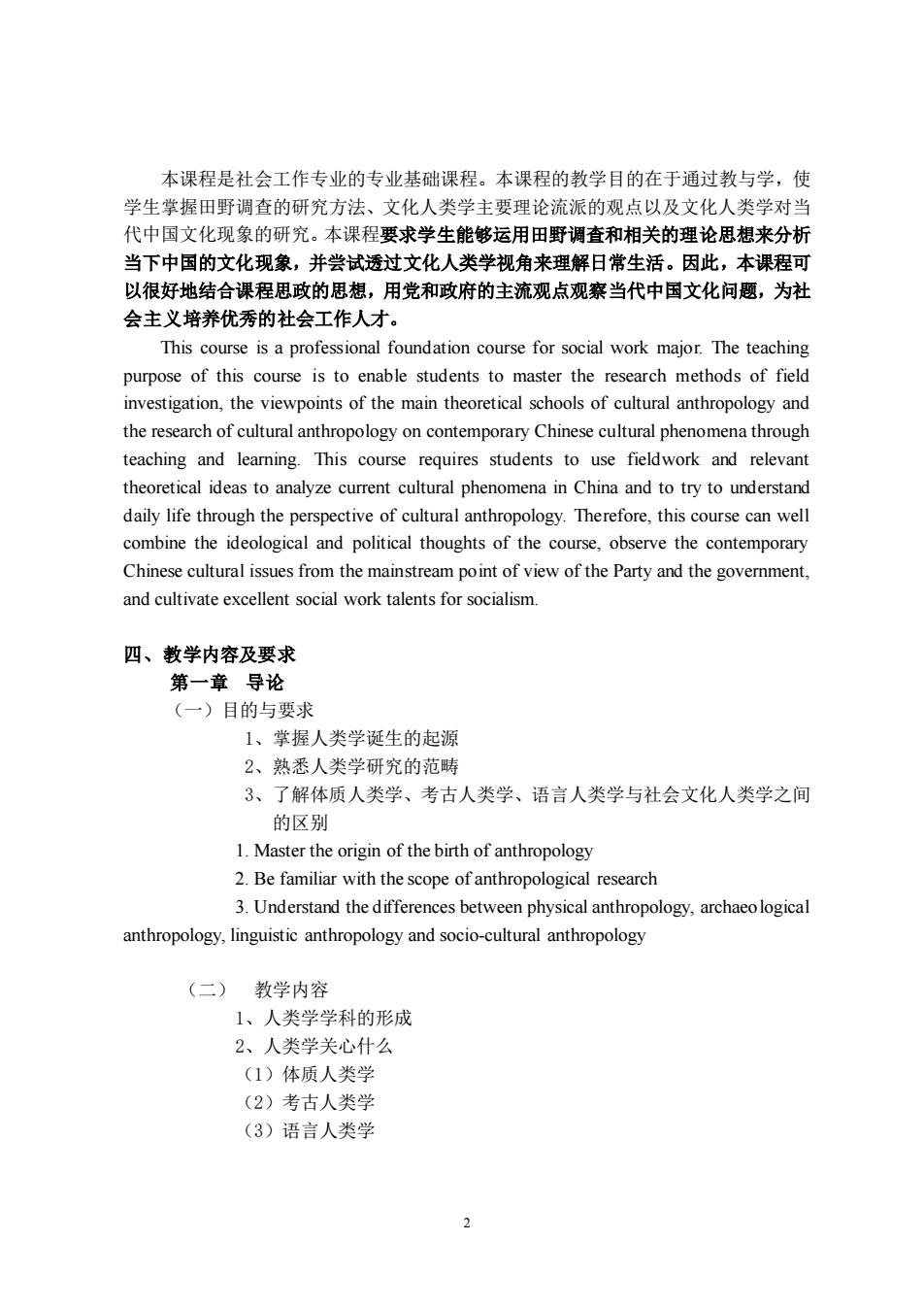
本课程是社会工作专业的专业基础课程。本课程的教学目的在于通过教与学,使 学生掌握田野调查的研究方法、文化人类学主要理论流派的观点以及文化人类学对当 代中国文化现象的研究。本课程要求学生能够运用田野调查和相关的理论思想来分析 当下中国的文化现象,并尝试透过文化人类学视角来理解日常生活。因此,本课程可 以很好地结合课程思政的思想,用党和政府的主流观点观察当代中国文化问题,为社 会主义培养优秀的社会工作人才。 This course is a professional foundation course for social work major.The teaching purpose of this course is to enable students to master the research methods of field investigation,the viewpoints of the main theoretical schools of cultural anthropology and the research of cultural anthropology on contemporary Chinese cultural phenomena through teaching and leamning.This course requires students to use fieldwork and relevant theoretical ideas to analyze current cultural phenomena in China and to try to understand daily life through the perspective of cultural anthropology.Therefore,this course can well combine the ideological and political thoughts of the course.observe the contemporary Chinese cultural issues from the mainstream point of view of the Party and the goverment and cultivate excellent social work talents for socialism. 四、教学内容及要求 第一章导论 (一)目的与要求 1、掌握人类学诞生的起源 2、熟悉人类学研究的范畴 3、了解体质人类学、考古人类学、语言人类学与社会文化人类学之间 的区别 1.Master the origin of the birth of anthropology 2.Be familiar with the scope of anthropological research 3.Understand the differences between physical anthropology,archaeological anthropology,linguistic anthropology and socio-cultural anthropology (二)教学内容 1、人类学学科的形成 2、人类学关心什么 (1)体质人类学 (2)考古人类学 (3)语言人类学
2 本课程是社会工作专业的专业基础课程。本课程的教学目的在于通过教与学,使 学生掌握田野调查的研究方法、文化人类学主要理论流派的观点以及文化人类学对当 代中国文化现象的研究。本课程要求学生能够运用田野调查和相关的理论思想来分析 当下中国的文化现象,并尝试透过文化人类学视角来理解日常生活。因此,本课程可 以很好地结合课程思政的思想,用党和政府的主流观点观察当代中国文化问题,为社 会主义培养优秀的社会工作人才。 This course is a professional foundation course for social work major. The teaching purpose of this course is to enable students to master the research methods of field investigation, the viewpoints of the main theoretical schools of cultural anthropology and the research of cultural anthropology on contemporary Chinese cultural phenomena through teaching and learning. This course requires students to use fieldwork and relevant theoretical ideas to analyze current cultural phenomena in China and to try to understand daily life through the perspective of cultural anthropology. Therefore, this course can well combine the ideological and political thoughts of the course, observe the contemporary Chinese cultural issues from the mainstream point of view of the Party and the government, and cultivate excellent social work talents for socialism. 四、教学内容及要求 第一章 导论 (一)目的与要求 1、掌握人类学诞生的起源 2、熟悉人类学研究的范畴 3、了解体质人类学、考古人类学、语言人类学与社会文化人类学之间 的区别 1. Master the origin of the birth of anthropology 2. Be familiar with the scope of anthropological research 3. Understand the differences between physical anthropology, archaeological anthropology, linguistic anthropology and socio-cultural anthropology (二) 教学内容 1、人类学学科的形成 2、人类学关心什么 (1)体质人类学 (2)考古人类学 (3)语言人类学
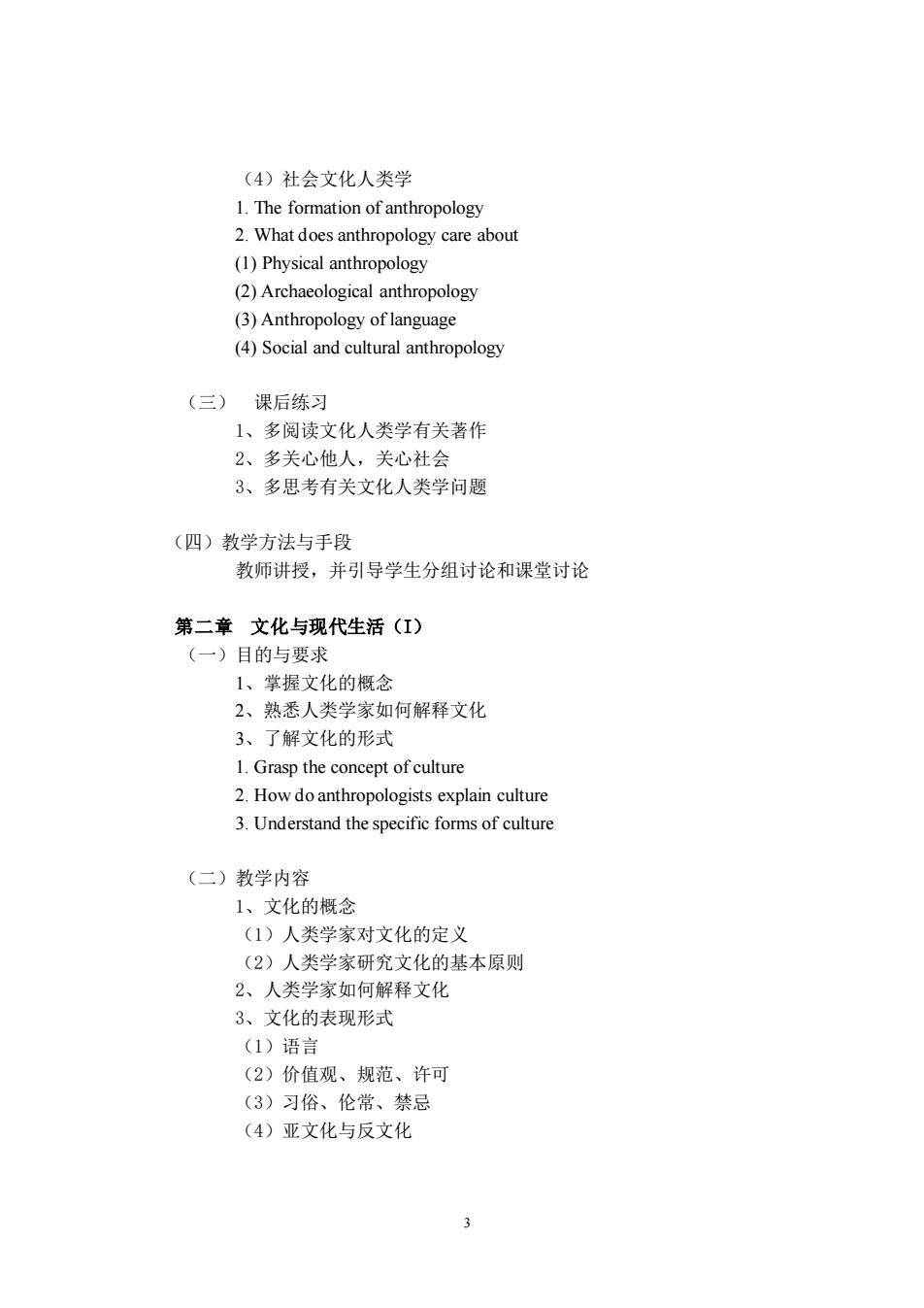
(4)社会文化人类学 1.The formation of anthropology 2.What does anthropology care about (1)Physical anthropology (2)Archaeological anthropology (3)Anthropology of language (4)Social and cultural anthropology (三)课后练习 1、多阅读文化人类学有关著作 2、名关心他人,关心社会 3、多思考有关文化人类学问题 (四)教学方法与手段 教师讲授,并引导学生分组讨论和课堂讨论 第二章文化与现代生活(I) (一)目的与要求 1、掌握文化的概念 2、熟悉人类学家如何解释文化 3、了解文化的形式 1.Grasp the concept of culture 2.How do anthropologists explain culture 3.Understand the specific forms of culture (二)教学内容 1、文化的概念 (1)人类学家对文化的定义 (2)人类学家研究文化的基本原则 2、人类学家如何解释文化 3、文化的表现形式 (1)语言 (2)价值观、规范、许可 (3)习俗、伦常、禁忌 (4)亚文化与反文化 3
3 (4)社会文化人类学 1. The formation of anthropology 2. What does anthropology care about (1) Physical anthropology (2) Archaeological anthropology (3) Anthropology of language (4) Social and cultural anthropology (三) 课后练习 1、多阅读文化人类学有关著作 2、多关心他人,关心社会 3、多思考有关文化人类学问题 (四)教学方法与手段 教师讲授,并引导学生分组讨论和课堂讨论 第二章 文化与现代生活(I) (一)目的与要求 1、掌握文化的概念 2、熟悉人类学家如何解释文化 3、了解文化的形式 1. Grasp the concept of culture 2. How do anthropologists explain culture 3. Understand the specific forms of culture (二)教学内容 1、文化的概念 (1)人类学家对文化的定义 (2)人类学家研究文化的基本原则 2、人类学家如何解释文化 3、文化的表现形式 (1)语言 (2)价值观、规范、许可 (3)习俗、伦常、禁忌 (4)亚文化与反文化
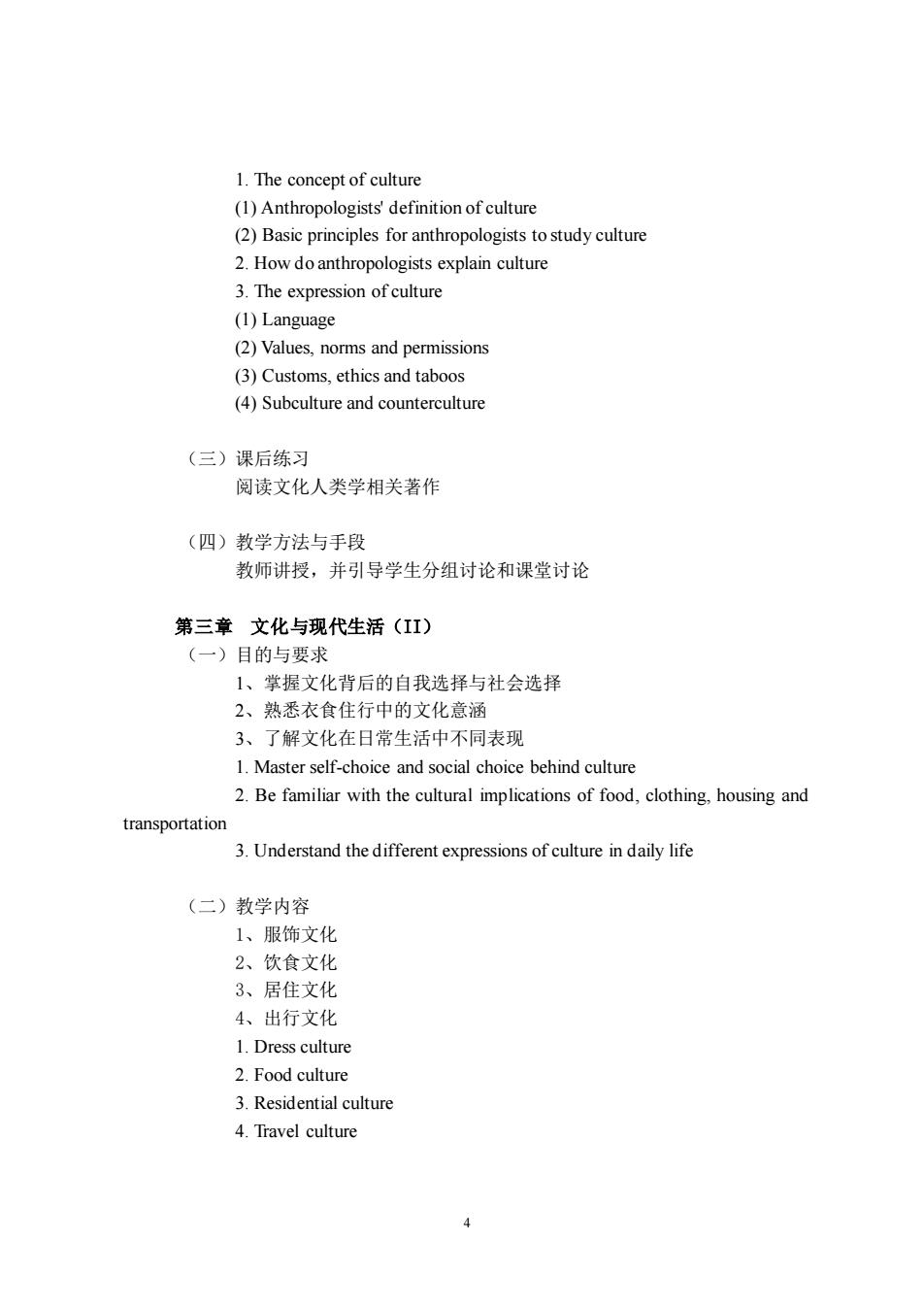
1.The concept of culture (1)Anthropologists'definition of culture (2)Basic principles for anthropologists to study culture 2.How do anthropologists explain culture 3.The expression of culture (1)Language (2)Values,norms and permissions (3)Customs.ethics and taboos (4)Subculture and counterculture (三)课后练习 阅读文化人类学相关著作 (四)教学方法与手段 教师讲授,并引导学生分组讨论和课堂讨论 第三章文化与现代生活(II) (一)目的与要求 1、掌握文化背后的自我选择与社会选择 2、熟悉衣食住行中的文化意涵 3、了解文化在日常生活中不同表现 1.Master self-choice and social choice behind culture 2.Be familiar with the cultural implications of food,clothing,housing and transportation 3.Understand the different expressions of culture in daily life (二)教学内容 1、服饰文化 2、饮食文化 3、居住文化 4、出行文化 1.Dress culture 2.Food culture 3.Residential culture 4.Travel culture
4 1. The concept of culture (1) Anthropologists' definition of culture (2) Basic principles for anthropologists to study culture 2. How do anthropologists explain culture 3. The expression of culture (1) Language (2) Values, norms and permissions (3) Customs, ethics and taboos (4) Subculture and counterculture (三)课后练习 阅读文化人类学相关著作 (四)教学方法与手段 教师讲授,并引导学生分组讨论和课堂讨论 第三章 文化与现代生活(II) (一)目的与要求 1、掌握文化背后的自我选择与社会选择 2、熟悉衣食住行中的文化意涵 3、了解文化在日常生活中不同表现 1. Master self-choice and social choice behind culture 2. Be familiar with the cultural implications of food, clothing, housing and transportation 3. Understand the different expressions of culture in daily life (二)教学内容 1、服饰文化 2、饮食文化 3、居住文化 4、出行文化 1. Dress culture 2. Food culture 3. Residential culture 4. Travel culture
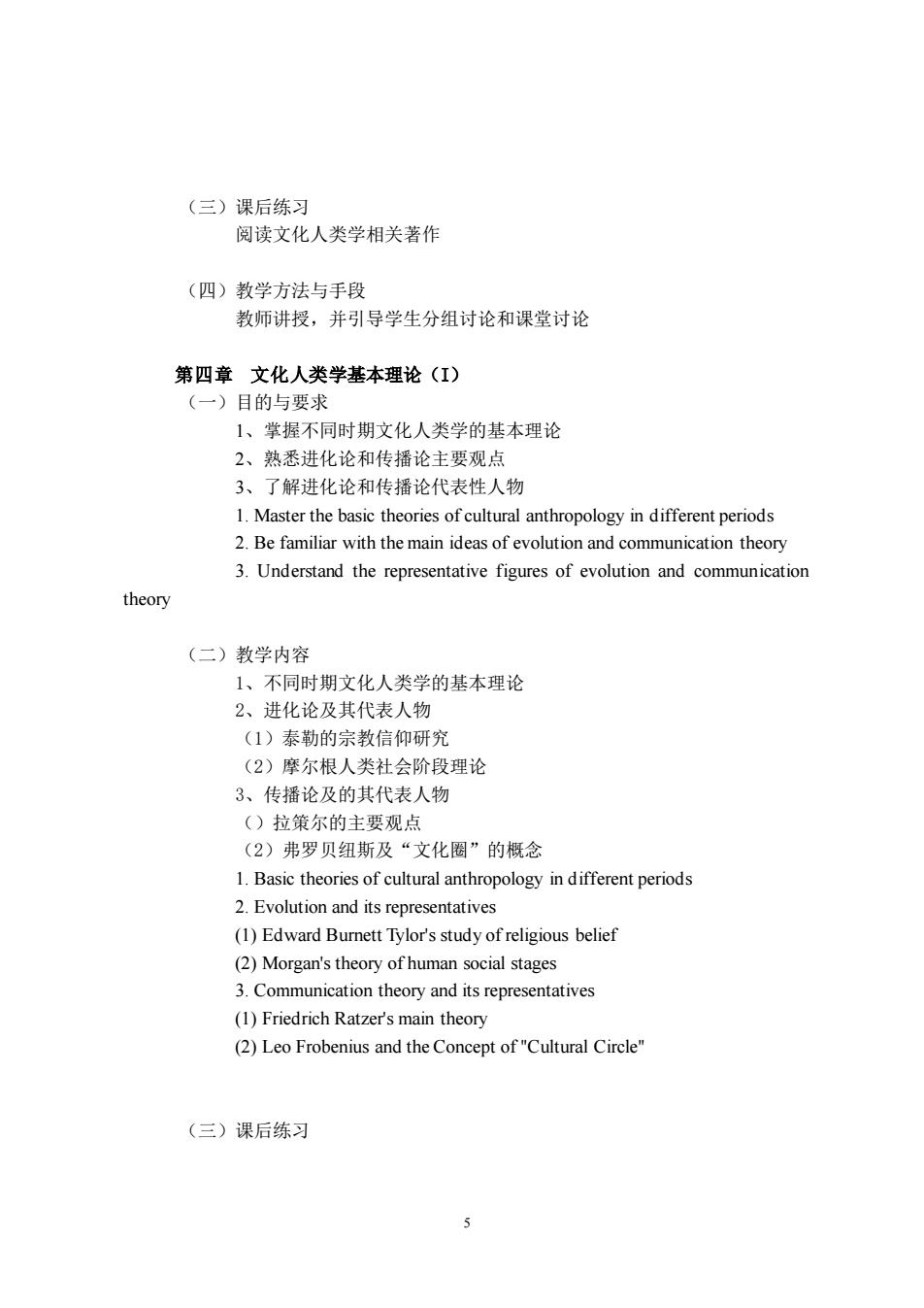
(三)课后练习 阅读文化人类学相关著作 (四)教学方法与手段 教师讲授,并引导学生分组讨论和课堂讨论 第四章文化人类学基本理论(I) (一)目的与要求 1、掌握不同时期文化人类学的基本理论 2、熟悉进化论和传播论主要观点 3、了解进化论和传播论代表性人物 1.Master the basic theories of cultural anthropology in different periods 2.Be familiar with the main ideas of evolution and communication theory 3.Understand the representative figures of evolution and communication theory (二)教学内容 1、不同时期文化人类学的基本理论 2、进化论及其代表人物 (1)泰勒的宗教信仰研究 (2)摩尔根人类社会阶段理论 3、传播论及的其代表人物 ()拉策尔的主要观点 (2)弗罗贝纽斯及“文化圈”的概念 1.Basic theories of cultural anthropology in different periods 2.Evolution and its representatives (1)Edward Burnett Tylor's study of religious belief (2)Morgan's theory of human social stages 3.Communication theory and its representatives (1)Friedrich Ratzer's main theory (2)Leo Frobenius and the Concept of"Cultural Circle" (三)课后练习 5
5 (三)课后练习 阅读文化人类学相关著作 (四)教学方法与手段 教师讲授,并引导学生分组讨论和课堂讨论 第四章 文化人类学基本理论(I) (一)目的与要求 1、掌握不同时期文化人类学的基本理论 2、熟悉进化论和传播论主要观点 3、了解进化论和传播论代表性人物 1. Master the basic theories of cultural anthropology in different periods 2. Be familiar with the main ideas of evolution and communication theory 3. Understand the representative figures of evolution and communication theory (二)教学内容 1、不同时期文化人类学的基本理论 2、进化论及其代表人物 (1)泰勒的宗教信仰研究 (2)摩尔根人类社会阶段理论 3、传播论及的其代表人物 ()拉策尔的主要观点 (2)弗罗贝纽斯及“文化圈”的概念 1. Basic theories of cultural anthropology in different periods 2. Evolution and its representatives (1) Edward Burnett Tylor's study of religious belief (2) Morgan's theory of human social stages 3. Communication theory and its representatives (1) Friedrich Ratzer's main theory (2) Leo Frobenius and the Concept of "Cultural Circle" (三)课后练习